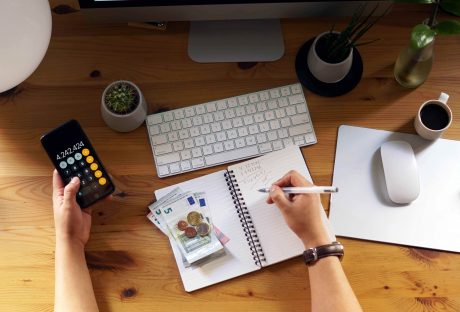Anxiety is a psychological issue that quietly steals our inner peace with no hype or warning. This condition robs many of us in our most private moments.
Picture this: You are sitting in silence, maybe sipping your morning coffee, when, without warning, a thought hits you. Did I remember to lock the door? Did I turn off the stove? What if the interview tomorrow completely goes wrong? With every question you ask, you take part in small rituals that can, without your knowing, worsen your anxiety. These patterns appear to be nothing but are what we typically do when we’re not feeling our best. But when we indulge in them, they make our already stressful emotional state even more stressful and threaten to completely disrupt it.
Like these, many small daily habits make our anxiety worse without us knowing are as follows:
Constantly Checking Of Phone:
Every time in the middle of our sleep, or whenever we feel bored, our hands and mind go towards the phone. This repetitive checking of our phones with thoughts like “Did I miss an important message? Is someone out there trying to reach me?” at every buzz and beep feeds our anxiety more.
Being constantly alert is like living in a state of hyper-alertness, where even the slightest buzz of a notification can lead to provoke a very fragile peace of mind.
Overthinking Every Interaction:
You may rehearse talks held in the past, going over people’s content in your mind, word for word, and possibly even intonation for intonation, while also going over and over any ‘what-ifs’ that seem to invite some bit of oracular thinking.
- Did I mis-speak?
- Did I come across incorrectly?
- Did they really mean what they said, or did they say it because they thought I would think they meant what they said?
Procrastinating On Important Tasks:
It may seem like a small rebellion, but procrastination is a habit of withdrawing from the demands of life. As the deadline approaches, we feel the weight of procrastination like a weight hanging on our neck. We worry about unfinished tasks (despite working on them) and let our imaginations run wild with unanswered questions like:
- What if I don’t get it done on time?
- What if my work isn’t up to mark?
- Why can’t I just stop avoiding this and get on with it?
Comparing Oneself To Others:
In the modern digital world, comparing yourself with others via see on social media is common. You can’t help but look at the pictures of success and pure bliss that fill your feed, and wonder if your life will ever be like that. You wonder what those people have that you don’t, and if it’s something you can or should try to achieve.
Ignoring Your Body’s Warning Signals:
Fatigue, stress, and anxiety can make us want to keep going and ignore our body’s signals. Sometimes these signals are so easy to ignore that it’s easy to associate them with skipping a meal or not getting enough sleep at night.
But when we ignore our body’s signals, when we pretend that everything is fine, and when we tell ourselves that we’ll feel better once we’ve passed the next deadline, we’re only making our anxiety worse.
Don’t avoid it. Acknowledge your body’s discomfort and give yourself a chance to mentally reset. Your body has natural signals that tell you when something is wrong. If you keep going, your mental health will suffer.
Engaging In Negative Self-Talk:
Our mental health can be profoundly affected by the way we converse with ourselves. If you are always telling yourself that you are not doing things right or you are doubting your capabilities, then you are really fueling your anxiety. This internal conversation can turn into an unending loop that makes you feel more and more inadequate and fearful.
Avoiding Social Situations:
Though it might come as a relief to avoid parties or any kind of social interaction, we know now that it can only lead to feeling more anxious and definitely more alone.
The habit of ignoring social spaces feeds our fear of them and makes us think we’re much more unique in our situation than is actually the case. And when we don’t hang out in group settings, we tend to psych ourselves out about it even more.
Consuming Negative Media:
The content we absorb can mold our perceptions and emotions. When we are exposed repeatedly to negative news or troubling material, our baser instincts take over. We start feeling more and more anxious.
- What if the world is falling apart?
- What if something really, really bad happens to me or my loved ones?
Thoughts like these can easily take over; after all, bad news is a powerful attention grabber, especially for an overthinker. But in the end, what do we gain from consuming so much negativity?
Skipping Meals Or Eating Unhealthily:
Our physical and mental health are inseparably connected. Poor nutrition and inconsistent eating habits can lead to energy highs and lows that intensify mood disorders.
You could be mentally fine, but then something happens that upsets your diet. You could be in a good dietary condition, but then something happens that upsets your mood. Taken together, these two findings suggest that when you have a poor diet, you may be more vulnerable to psychosocial stress.
Not Seeking Help:
One of the most toxic habits is not asking for help. This can mean anything from confiding in a trusted friend to talking with a professional. The stigma surrounding mental health can keep you in an anxiety-end loop, wondering: What if they don’t get it? What if I’m mocked? What if they left me with addictive medication?
The habit of not asking for help can have you double your already devastating state. You’re already anxious, and now you’re supposed to just eliminate your condition better.
The Takeaway
Think about some of your daily habits and acknowledge that they are not mere symptoms but are the emotional experiences that can feel all-consuming. They are the fears of the future, the worries about what lies ahead. If silence isn’t peaceful for you, if your mind is filled with questions like, “What if I never find a job?” or “What if I fail my exam?” then you may be dealing with an emotional breakdown.
During times of acute anxiety, it is essential to focus on breathing exercises or other positive activities. However, remember that anxiety is a psychological issues that need prompt intervention. If you are suffering from prolonged and chronic anxiety, please don’t suffer in silence if you are exhibiting all these habits.
Anxiety is a treatable condition. Just try to add one more habit, a bit of professional care of mind, like we do for our physical condition (like a regular medical checkup), at the comfort of your home through a telehealth platform.
Read Also:
- 10 Health Problems Eased by Yoga
- 10 healthy habits to improve your health
- 5 Protein Enriched Food To Improve Mental Health























